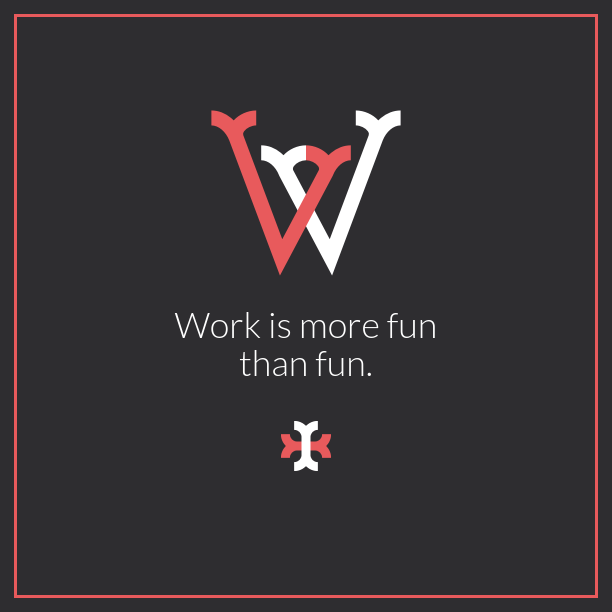It’s depression.
“Virtually every activity we would describe as ‘relaxing’ kind of fun—watching television, eating chocolate, window shopping, or just chilling out—doesn’t make us feel better. In fact, we consistently report feeling worse afterward than when we started having fun: less motivated, less confident, and less engaged overall.” (Jane McGonigal, Reality is Broken, p.31)
I’ve come to love work, possibly more than any other pursuit. And that’s saying something. I love. love. love. scuba diving, CrossFit, golf, travel, adventure races, and video games. But I love work even more.
Why?
McGonigal—whose work has made me an instant fan—ascribes it to the difference between duress and euress (two Greek words that refer to differing kinds of stress). Duress is pressure from the outside to perform. Euress is happy stress, the ambition we have to accomplish that which we love. With euress, we don’t experience any anxiety or fear. Since we’re the ones putting pressure on ourselves—and that pressure is centered on something about which we are passionate—we are confident, optimistic, and joyful about both the process and the potential outcomes.
As McGonigal sums up, “We’re much happier enlivening time than killing it.”
Because work is more fun than fun.
Kinds of work
There is a surprising variety to our work, and—as I’ve stated before—the most productive people are the ones who can switch back and forth between different kinds of work, capitalizing on the lag time between creative surges in each manifestation of their brain power for the benefit of an ancillary project. There are eight broad categories of work.
- High stakes work—this is work of critical importance, the stuff that must get done in order for everything else to even be possible. In a church, raising money is high stakes work. If you can’t pay your staff, you can’t work with a sufficient number of lay people to heal the world.
- Busy work—this is work we do when we’re just taking care of little details, like checklists. It’s menial and low-risk, but sometimes necessary.
- Mental work—this is thinking work, perhaps the most dangerous kind. Why? As I’ll explain below, mental work is often the least productive, even though we feel like we’ve put out a great deal of energy.
- Physical work—this is anything we do with our hands, our backs, our legs, our bodies. Physical work is invigorating, since it generates endorphins and sends signals to our brain that remind us to wake up.
- Discovery work—this is the benefit of research and synthesis, resulting from connecting dots across disciplines, media, and experimentation.
- Teamwork—this is the work we do with others that produces meaningful results.
- Creative work—this is the work of making things or making things up. The best kind of creativity is generative, meaning we bring something new into existence.
- Working out—I’d be remiss if I didn’t also include physical work that doesn’t accomplish professional goals, but only personal ones. The older I get, the more I realize I cannot trust my body to keep up with my mind. It takes work, and that work has to be handled independently from the work associated with my profession, my family, and my leisure.
How you complete that work
Work is something that can be accomplished. Work is actionable. If you spend an entire day reading, studying, and comparing resources, it feels like work but you’ve accomplished nothing. The only way that work has value is for you to take notes, compare citations, and begin to write down initial observations. Your work is what you’ve done that you can show to others.
Getting work done requires actionable tasks with observable results. That’s why so much of our work feels ineffectual and laborious—we can’t prove that we’ve accomplished anything.
Because we haven’t.
If you use the analogy of football, work is what gets us further down the field on offense. Things like reading or making phone calls feel like work but are the equivalent to a running play with zero yards gained. It was hard. You tried. But you accomplished nothing. In order for those phone calls to matter, you’ve got to secure plans on the calendar with achievable outcomes that contribute to your overall vision for the future of your ministry, your job, etc.
fossores
Related posts
Categories
Category Cloud
Tag Cloud
Recent Posts
- Victors and Victims November 6, 2018
- 3 Hacks for Happiness October 29, 2018
- Hope Against Death September 20, 2018
- The Shape Of The Cross September 19, 2018


